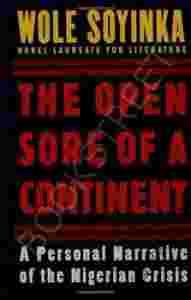|
On November 10, 1995, the Nigerian military
government under General Sani Abacha executed dissident
writer Ken Saro-Wiwa along with eight other activists,
and the international community reacted with outrage.
The response was quick, decisive, and nearly unanimous:
Nigeria is an outcast in the global village. The events
that led up to Saro-Wiwa's execution mark Nigeria's
decline from a post-colonial success story to its
current military dictatorship, and few writers have been
more outspoken in decrying and lamenting this decline
than Nobel Prize laureate and Nigerian exile Wole
Soyinka. In The Open Sore of a Continent, Soyinka, whose
own Nigerian passport was confiscated 1994, explores the
history and future of Nigeria in a compelling jeremiad
that is as intense as it is provocative, learned, and
wide-ranging. He deftly explains the shifting dramatis
personae of Nigerian history and politics , arguing that
'a glance at the mildewed tapestry of the stubbornly
unfinished nation edifice' is necessary to explain where
Nigeria can go next. In the process of elucidating the
Nigerian crisis, Soyinka opens readers to the broader
questions of nationhood, identity, and the general state
of African culture and politics at the end of the
twentieth century. He examines the different ways in
which a nation can be defined, and asks how these
varying definitions impact the people who live under
them? Soyinka concludes with a resounding call for
international attention to this question: the global
community must address the issue of nationhood to
prevent further religious mandates and calls for ethnic
purity of the sort that have turned Algeria, Rwanda,
Bosnia, and Sri Lanka into killing fields.
|
|

